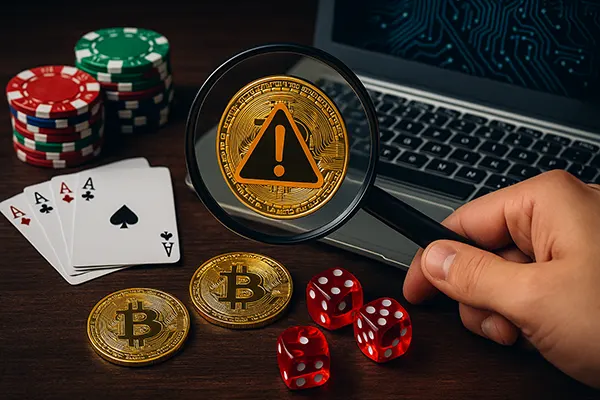
Cryptocurrency Scams Tied to Fake Crypto Casinos: How to Detect and Avoid Them
In early 2025, crypto casino scams remain a persistent threat, especially as fraudulent operators become increasingly sophisticated. From fake bonuses to phishing websites, these scams exploit the growing interest in decentralised gambling. Identifying and avoiding them requires a solid understanding of how scams work and which tools can help verify the legitimacy of a service before engaging with it.
Common Cryptocurrency Scam Tactics Used by Fake Casinos
Scammers often exploit the anonymity and decentralised nature of cryptocurrencies to deceive users. Fake crypto casinos typically promise high returns and quick withdrawals to lure victims. Once users deposit their funds, access is denied, and the casino disappears without a trace.
Another common scheme involves phishing. Fake websites mimic the look of well-known crypto casinos, tricking users into entering private keys or wallet credentials. This leads to immediate asset theft, often without any possibility of recovery due to blockchain’s irreversible nature.
Private key theft is also widespread. In these cases, users are encouraged to “sync” their wallets through browser extensions or mobile apps, which secretly capture login data. Once access is granted, criminals drain funds directly from user accounts.
Examples from 2024–2025: Real-World Case Studies
One notable case occurred in November 2024, when a fake casino known as “RoyalBit Games” scammed users across Eastern Europe. The site promised 300% bonuses and advertised through fake YouTube reviews. Victims reported total losses exceeding $2 million in Bitcoin and Ethereum.
In January 2025, cybersecurity firm ChainTrace flagged a widespread phishing campaign where cloned versions of popular casino brands were distributed via Telegram and X (formerly Twitter). These replicas redirected users to malicious sites asking for wallet seed phrases.
Another major incident was the takedown of “LunaStake Casino”, which harvested Solana wallet data through browser-based malware. Users unknowingly installed malicious scripts that accessed clipboard data and harvested private keys, leading to mass thefts.
How to Protect Yourself from Crypto Casino Scams
There are actionable steps any user can take to stay safe. First, always research the service’s domain age, ownership, and reviews on third-party sites. Scammers often use new domains with no verifiable ownership.
Second, never enter a private key or seed phrase into any website or form. Legitimate casinos never require this information. Users should interact only with trusted wallet applications and enable hardware wallet integration where possible.
Finally, pay attention to site design and contact details. Genuine services usually have proper licensing information, transparent policies, and responsive support. Poor grammar, vague contact information, or excessive promotional language are red flags.
User Security Checklist
– Use hardware wallets or browser extensions with strong security reputations (e.g., MetaMask, Trezor).
– Avoid clicking on casino links from social media ads or direct messages. Always type the URL manually or use bookmarks.
– Enable two-factor authentication for all connected exchange and wallet accounts. Also, regularly monitor for unauthorised login attempts.

Verifying the Legitimacy of a Crypto Casino
Legitimate crypto casinos operate under proper licences from regulatory authorities such as Curaçao eGaming, the Isle of Man Gambling Supervision Commission, or the Malta Gaming Authority. Reputable casinos publicly display their licence numbers and company registration details, which can be cross-checked in the respective jurisdiction’s registry. A site that withholds this data, or displays unverifiable or forged documents, should be avoided immediately. In 2025, many regulatory bodies also provide real-time digital verification tools for checking licences.
Another essential sign of credibility is technical transparency. Decentralised casinos typically operate using smart contracts on blockchains like Ethereum, BNB Chain or Solana. These contracts should be publicly available and preferably audited by cybersecurity firms such as CertiK, Hacken or Trail of Bits. Lack of an audit or the use of obfuscated code is a major red flag, especially if the casino claims to operate “provably fair” games without publishing the mechanics.
Payment transparency is a further indicator of legitimacy. Honest casinos allow users to view their bets, payouts and balances on-chain, using blockchain explorers. Services that require off-chain deposits without proof of processing, or where winnings are not publicly verifiable, leave users vulnerable to exit scams or manipulated outcomes. Trustworthy platforms typically implement verifiable randomness protocols, like Chainlink VRF, to guarantee fairness.
Tools and Services for Verification
There are several trusted tools and services that can help assess the credibility of a crypto casino. First, use WHOIS lookup services (such as who.is or ICANN WHOIS) to check domain age, ownership, and hosting location. Many scam casinos use recently created domains with privacy-protected registration to avoid traceability. In contrast, reliable services often have domains older than a year, with transparent administrative data available.
Blockchain explorers are indispensable for users engaging with on-chain casinos. Tools like Etherscan, BscScan or Solscan allow players to inspect the smart contracts in use, review recent transactions, and validate payout history. If the casino claims to use smart contracts but none are verifiable, it is likely fraudulent. Moreover, checking for third-party audit reports directly linked from these explorers can strengthen trust in the service’s technical foundation.
Finally, user forums and community-driven sources are invaluable for detecting scam reports and patterns. Platforms like Reddit, BitcoinTalk, and Trustpilot often contain discussions from real users describing their experiences—both positive and negative. Searching for the casino’s name across multiple sources can reveal complaints, delayed payouts, or outright fraud. By combining domain analysis, smart contract inspection, and user feedback, players can make informed decisions and avoid becoming victims of crypto casino scams.
Similar articles
-
 Deposit and withdrawals via L2 / Lightning: whe...
Deposit and withdrawals via L2 / Lightning: whe...By 2026, second-layer crypto infrastructure has matured significantly, yet the …
-
 Gamdom: a crypto casino look at “boosted RTP” —...
Gamdom: a crypto casino look at “boosted RTP” —...“Boosted RTP” sounds simple: a higher return-to-player percentage on certain …
-
 What Real Anonymity in Cryptocurrencies Means i...
What Real Anonymity in Cryptocurrencies Means i...People often say they want “anonymous crypto”, but in 2026 …
-
 How to Prepare a Cryptocurrency Portfolio for P...
How to Prepare a Cryptocurrency Portfolio for P...The European Union is entering a decisive phase in the …
